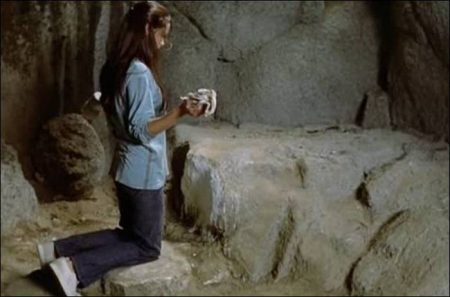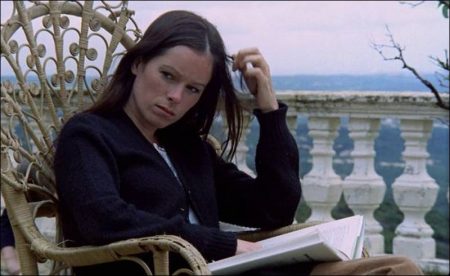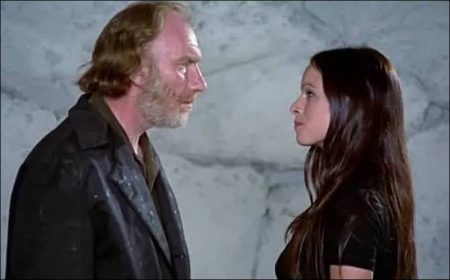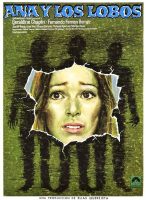Ana and the Wolves movie storyline. The young but travelled Ana (Geraldine Chaplin) arrives in a manor in the countryside of Spain to work as nanny of three girls and finds a dysfunctional family: the matriarch is a sick old woman obsessed by death and having constant nervous breakdowns.
Her son José was raised dressing in girl’s clothes until his First Communion and is obsessed by military clothes and paraphernalia; Juan, the father of the three girls, a pervert since his childhood, writes pornographic letters to Ana; his wife, Luchy, has suicidal tendencies; and the mystic and religious eremite Fernando, who was inflicted to flagellation in his childhood, lives as a recluse in a cave. The presence of Ana disturbs the three brothers with tragic consequences.
Ana and the Wolves (Spanish: Ana y los lobos) is a 1973 Spanish drama film directed by Carlos Saura. Starring Geraldine Chaplin as a foreign governess who comes to an isolated house to take care of the children of a convoluted family. The film is encoded with political symbolism of Francoist Spain. Saura’s 1979 Mamá cumple cien años was a sequel of sorts. It was entered into the 1973 Cannes Film Festival.
About the Story
Ana, a young foreign governess, arrives to an isolated country estate in arid region of Castile, near Madrid. She has come to take charge of three little girls whose mother, Luchy, greets Ana upon arrival. While Ana is unpacking, José, an uncle of the girls, introduces himself as the voice of order and authority in the family. In case Ana runs into any problem she must go to him, he explains.
A family dinner that evening allows Ana to meet her eccentric employers. The family consists of three middle age brothers (José, Juan and Fernando), their ailing mother, Mama; Luchy, Juan’s wife, and the couple’s three daughters: Carlota, Victoria and Natalia. At night, Natalia wakes up screaming after a nightmare. Juan, the father of the three girls, lusting over Ana, takes advantage of the situation to enter her bedroom. Firmly but politely, she rejects his sexual advances. Dominated by an uncontrollable sex drive, the rejected Juan looks for consolation with Amparo, one of the maids.
Surprisingly, Ana starts receiving erotic letters signed by a secret admirer who desires to be with her. They are delivered with rare postage from distance places each of them increasingly closer. José explains to Ana that he has not only opened and read those letters, but that he knows who has been sending them. Juan, he tells her, has been writing those letters using the family valuable collection of stamps to deceive her. José has set up a small museum of military dress in his study and he offers Ana his protection and some economical compensation if she takes care of the uniforms.

Fernando, the most subdued of the three brothers, has moved out of the main house to establish his residence in a nearby cave where he practices mystical incantations in an effort to levitate. Fernando intrigues Ana the most. She is both appalled by him and attracted to his way of life, as if understanding why he wants to escape from the world.
Between bouts of epilepsy and gout, Mama remains the protectress of the family unit. When she and Ana engage in direct dialogue, the old dowager gives Ana a bit of the background of the three sons as she shows the governess their childhood clothing she has saved for years. “ You must be understanding with them” mama tells her, as Ana becomes interested in the absurdity of what has been happening.
Ana now actively leads the three brothers on, playing to the fantasy life of each of the three men, at times, outwardly mocking them. Recruited to help José with his museum when he shots a flying bird to scare her, Ana is bemused and gives him a medal as a reward.
Ana and the Wolves (1973)
Directed by: Carlos Saura
Starring: Geraldine Chaplin, Fernando Fernán Gómez, Rafaela Aparicio, José María Prada, José Vivó, Marisa Porcel, María José Puerta, Sara Gil, Charo Soriano, Anny Quinas, Nuria Lage
Screenplay by: Carlos Saura, Rafael Azcona
Cinematography by: Luis Cuadrado
Film Editing by: Pablo G. del Amo
Set Decoration by: Elisa Ruiz
Art Direction by: Jaime Chávarri, Francisco Nieva
Music by: Luis de Pablo
MPAA Rating: None.
Distributed by: Worldwide Entertainment
Release Date: July 16, 1973
Views: 191


